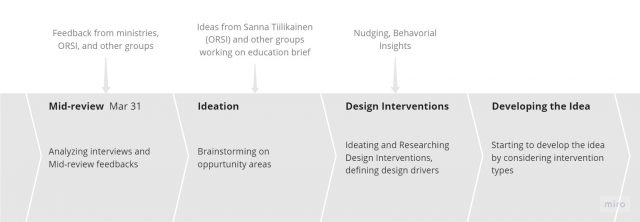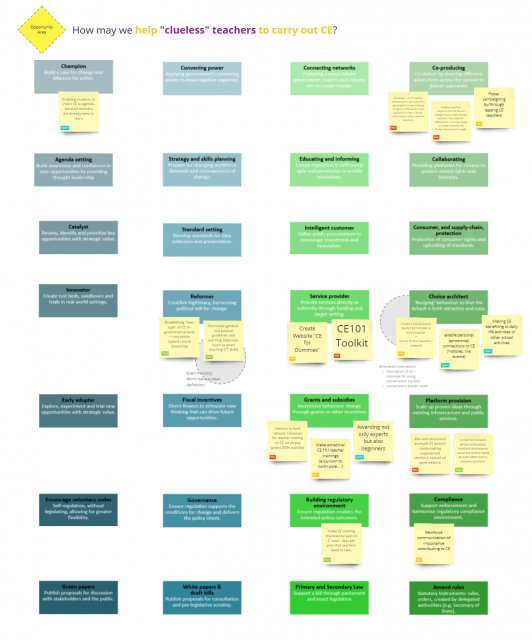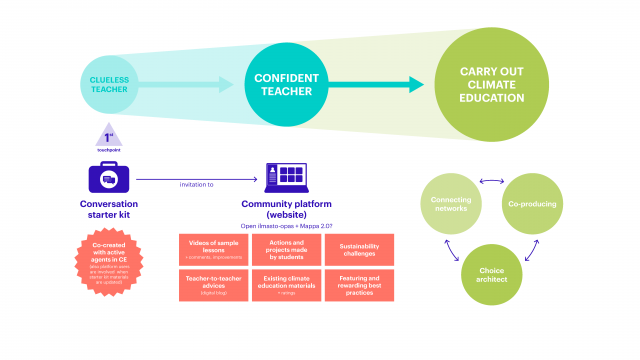This blog post reports on work-in-progress within the Design for Government (DfG) course! The post is written by one of the groups dealing with the project brief on ‘Boosting climate education’ provided by the Ministry of Environment (YM) in collaboration with the Ministry of Education and Culture (OKM), the Finnish National Agency for Education (OPH) and the Orchestrating for Systemic Impact research project (ORSI). The group includes Paula Ikonen, Aybars Senyildiz, Zhiwen (Wen) Yap, and Felix Zelck.
As we get closer to the final presentation of our project, we are both impressed by our insights and excited to see the results of our research process, which was largely conducted remotely. After digesting the mid-review feedback from the participating stakeholders from the ministries and ORSI, we explored opportunity areas for Climate Education during a brainstorming session with the Education supergroup and Sanna Tiilikainen (ORSI). Later, we examined possible types of designerly-interventions with the framework of the “Government as a System” toolkit by the UK Policy Lab, and examples around the world in order to find new ideas. Lastly, we have started to develop an intervention proposal that envisions “a climate education platform” for teachers initiated by a “conversation starter kit”. Now, we are working on developing our idea further and preparing for the final show presentation on May 19.

Systems are about relationships rather than individuals
Finland has a political goal of being carbon-neutral by 2035, which requires a pro-active and climate-conscious younger generation to carry Finland into a decarbonized future. As the education system plays a crucial role in moving society forward, climate education has an important role in building a sustainable future. However, large systems — like the education system — are generally inflexible and react slowly to changes (Meadows 1999, p. 7), hence necessitating strategic interventions for change. As we shared in our Mid-review presentation, “Teacher Autonomy” is a cornerstone of the Finnish education system, as a result of trust in Finnish society, and the high competency levels of teachers. We believe that the autonomy teachers enjoy is a great enabler rather than an obstacle for systemic change, as it enables teachers to adapt their teaching according to their strengths, skills, and interests. On the other hand, teacher autonomy does not mean that teachers do not need any support. During our research, we observed that teachers are enthusiastic to learn more and sometimes need support from their surroundings, principals, and colleagues. Here, we understand the role of productive relationships among colleagues and an interactive teaching environment in the education system, which is sometimes overlooked due to daily routines and limitations of time in schools.

Climate is changing and so must education approaches
Our research revealed diverse approaches to climate change education in different domains. The complex nature of climate change knowledge, coupled with other trends in the socio-cultural sphere causes “uncertainties”, requires climate education to involve multiple perspectives rather than being reduced to just basic facts. The major approaches to climate change mainly involve scientific knowledge, however, more holistic perspectives involving ethical, political conversations, and an overarching understanding of democracy should be considered in parallel with climate education. Additionally, understanding the role of emotions in climate education, and finding the right balance between hope and anxiety could also support taking action against climate change.
In order to tackle the uncertainties and complexity of climate education, some educators are offering/incorporating more specialized and egalitarian teaching styles such as “learning by doing”, “teacher as a learner”, “learning together”, and “conversations based on student’s needs”. More flexibility in teaching methods and materials can encourage teachers to adapt climate education to their subjects (especially in secondary and high school level) and for different age groups. Moreover, teachers sharing their best practices and experiences can encourage other teachers to incorporate climate education into their teaching. In essence, knowledge will grow when shared.

Collaboration can spread best practices and leverage climate education
As Mirjami Lehikoinen (Business teacher in Perho Culinary, Tourism & Business College) stated, “sustainability can be incorporated in every subject, but it requires time, effort, and creativity. However, teachers generally do not have enough time” to incorporate climate change and sustainability in their teaching. This problem definition is leading us to provide an easy entry-point to climate education, with a platform and network that brings together best-practices shared by experienced teachers, curated climate education materials, to ensure collaboration despite the lack of time. A conversation starter kit inviting teachers to a climate education platform will create a collaborative learning environment and a virtual community of practice for teachers. Moreover, experienced teachers creating materials will enrich the variety of choices for different subjects, and enable teachers to select the best materials for their classes.
In sum, teacher autonomy helps teachers to be creative and utilize their strengths for teaching about climate change. However, some teachers need the support of seeing the best practices of colleagues when tailoring existing materials to their needs. Moreover, the complexity of climate change knowledge coupled with time limitations requires specialized and practical approaches for a broad and reciprocal learning process.
References:
Meadows, D. 1999. Leverage points: Places to Intervene in a System. The Sustainability Institute. Available at http://donellameadows.org/wp-content/userfiles/Leverage_Points.pdf
Policy Lab. 2020. Government as a System Toolkit. https://openpolicy.blog.gov.uk/2020/03/06/introducing-a-government-as-a-system-toolkit/
The DfG course runs for 14 weeks each spring – the 2020 course has now started and runs from 25 Feb to 19 May. It’s an advanced studio course in which students work in multidisciplinary teams to address project briefs commissioned by governmental ministries in Finland. The course proceeds through the spring as a series of teaching modules in which various research and design methods are applied to addressing the project briefs. Blog posts are written by student groups, in which they share news, experiences, and insights from within the course activities and their project development. More information here about the DfG 2020 project briefs. Hold the date for the public finale 09:00-12:00 on Tuesday 19 May!
